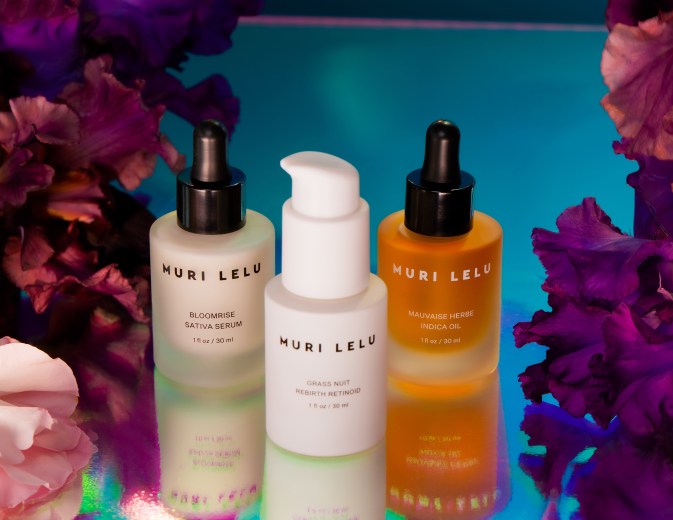In July, Allure published a story with the headline “We are gathered here today to say goodbye to CBD beauty.” The article wasn’t wrong. Several once-buzzy CBD beauty brands, including Lord Jones and its Kristin-Bell-fronted offshoot, Happy Dance, as well as Wldkat, are gone. Meanwhile, other former players have reformulated products to eliminate them of the once-ubiquitous ingredient. Those who have been involved in a CBD beauty brand know the related challenges, which include roadblocks with payment processors and the ability to advertise on social platforms, among other channels.
But one niche beauty brand with just three products is not giving up on the ingredient.
Muri Lelu launched in the summer of 2020, well into the peak of the CBD craze. According to Spate, Google monthly searches for “CBD Beauty” peaked at around 57,000 in December 2019. “We had been working on [the brand] for three years prior. We’d seen the CBD [trend] bubble up and thought we were going to be first to market with this luxury POV, but of course, we weren’t the first,” Elul said.
In August, Muri Lelu launched its third topical product, a CBD-infused retinol serum called the Grass Nuit Retinoid Treatment ($135). Its products range in price from $25 for minis to $225 for a bundle of two full-size products.

“From an efficacy standpoint and cultural standpoint, and [based on the] personal significance in our lives, we feel this is something we want to stand behind,” said Gilah Elul, one of Muri Lelu’s three co-founders.
CBD has been reported to have an anti-inflammatory, soothing effect on skin and is often recommended for those who suffer from skin-care concerns such as redness.
Ad position: web_incontent_pos1
As cannabis becomes legal in more places, Muri Lelu’s founders expect the stigma to decrease, Elul said. “Once the federal government gets their act together, [we’ll be] able to go full force, and we’ll have the infrastructure in place.” CBD is federally legal and legal in 47 states — all but Idaho, South Dakota and Nebraska.
Today, overall, “CBD” sees an average of 3.7 million monthly Google searches, reflecting a 32.5% year-over-year decrease. According to Spate, “CBD” searched alongside “skin care” gathers 43,000 average monthly searches, reflecting a 21.6% decrease compared to last year.
Muri Lelu has faced many of the same challenges as its CBD beauty peers. For example, “When we first started [setting up our website], we couldn’t even get on Shopify — but now you can [sell] CBD on Shopify. [Since] 2020, there have been a lot of changes and improvements,” Elul said. The commerce platform has allowed sales of CBD on its platform since 2019, but it requires sellers to use an outside payment processor.
The issue of payment processing presented another hurdle, Elul said. “We’ve had multi-brand retailers that were excited to bring us on, but they couldn’t because it would force them to switch their payment processor.” The brand uses North American Bancard to process payments. Eventually, this issue was somewhat resolved, however, as more retailers chose to make adjustments to accommodate sales of the trend. Muri Lelu now sells at retailers including The Detox Market in the U.S., as well as Thirteen Lune and Scout.
Marketing has not come easy for the brand. “It’s still something that we are figuring out every day,” said Elul. A brand cannot run ads on Meta or Google that directly mention cannabis, she explained. “You can do ‘CBD,’ but only in content deemed educational. And it can’t be a conversion-focused ad.” To educate on the benefits of CBD for the skin, Muri Lelu runs ads that lead to its blog, rather than its product pages.
Ad position: web_incontent_pos2
Of Muri Lelu’s digital advertising experience, Elul said, “It’s very arbitrary. We’ve gotten denied for some stuff and approved for some stuff. There’s still no fast and hard regulation.” Still, the brand is growing. This year, its DTC sales increased 50% and its Mauvaise Herbe Indica Oil won an Allure Best of Beauty award.




